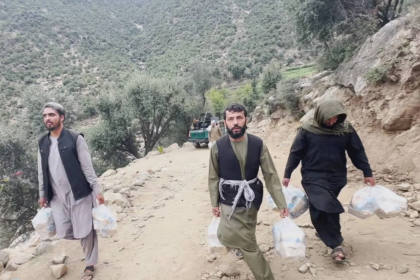RASC News Agency: As the Taliban regime continues its relentless crackdown on women’s rights, the Ministry of Public Health has recently inaugurated a women’s surgical unit at the Asadabad Provincial Hospital in Kunar. However, the irony of the situation is striking this facility, which was designed to serve women, was opened without the presence of a single woman in sight. The center, equipped with a budget of 1.8 million Kabuli rupees through HealthNet, now stands as a stark emblem of the regime’s discriminatory policies and growing gender segregation within Afghanistan’s public healthcare system. Images released from the inauguration ceremony reveal a gathering consisting solely of male Taliban officials, with no women present either as healthcare professionals or as patients. This glaring absence has raised serious concerns about the practical feasibility of the unit’s function. A spokesperson from the Taliban’s Ministry of Public Health claimed that the center is equipped with advanced medical tools and technologies, yet the central question remains: How can such a facility effectively serve its intended female clientele in the total absence of female medical staff?
The Taliban’s systematic bans on female education, especially in the medical field, have crippled the pipeline for training female doctors and healthcare workers. With the Taliban’s rigid policies preventing women from studying medicine, the country faces an acute shortage of female healthcare providers. Furthermore, through draconian measures like mandating male guardianship (Mahram) for women, reducing the salaries of female employees, and outright prohibiting women from working in healthcare institutions, the Taliban has created a hostile environment for female access to medical services. These restrictions effectively deny women the right to seek medical care from female healthcare providers thus exacerbating an already dire public health crisis. As the Taliban continues its oppressive policies, Afghanistan’s maternal and infant mortality rates are soaring. According to both the United Nations and UNICEF, the regime’s exclusionary policies are predicted to result in the preventable deaths of thousands of mothers and children annually. UNICEF projects that in 2025 alone, more than 5,000 women and children will die from preventable causes if the ban on women’s medical education persists.
The situation is particularly dire in Kandahar, the birthplace and stronghold of the Taliban, which has now become one of the world’s most dangerous regions for newborns. UNICEF reports that the neonatal mortality rate in Kandahar has exceeded the national average, with the region now ranked among the highest in the world for infant deaths. The collapse of international aid, combined with the closure of hundreds of healthcare facilities, has deepened the crisis, further straining an already overburdened health system and exacerbating the suffering of vulnerable populations. Health experts warn that these policies are not just a failure of governance but a clear violation of basic human rights that will have catastrophic long-term consequences for Afghanistan’s public health infrastructure. With women being systematically barred from participating in the healthcare workforce, the country is facing a devastating shortage of healthcare professionals and an inevitable collapse of its health services.
The Taliban’s refusal to reverse these policies will only further isolate Afghanistan from the international community, condemning the country to a future of increased poverty, disease, and death. Critics argue that this kind of governance a regime that prioritizes ideological control over human rights and public health signals a grim future for Afghanistan’s social and economic recovery. The inauguration of a women’s ward that fails to include women in its staffing is a grotesque reflection of the Taliban’s broader policy of gender-based exclusion, demonstrating that, for the regime, symbolism and oppression outweigh practical needs and the well-being of its people.
Despite the growing chorus of international condemnation, the Taliban appears unwavering in its stance, reinforcing policies that deprive women of basic rights and liberties. This ongoing violation of fundamental rights is not just a humanitarian crisis in the making it is a stark demonstration of a regime that has chosen to maintain power through division, exclusion, and oppression rather than through meaningful governance or care for its people.






